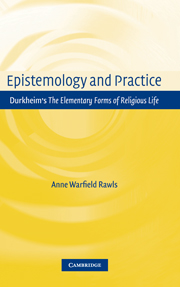Book contents
- Frontmatter
- Contents
- Acknowledgments
- Introduction
- 1 Durkheim's Outline of the Argument in the Introductory Chapter
- 2 Durkheim's Dualism: an Anti-Kantian, Anti-Rationalist Position
- 3 Sacred and Profane: the First Classification
- 4 Totemism and the Problem of Individualism
- 5 The Origin of Moral Force
- 6 The Primacy of Rites in the Origin of Causality
- 7 Imitative Rites and the Category of Causality
- 8 The Category of Causality
- 9 Logic, Language and Science
- 10 Durkheim's Conclusion Section iv: Logical Argument for Social Origin of the Categories
- Conclusion
- Bibliography
- Index
Conclusion
Published online by Cambridge University Press: 22 September 2009
- Frontmatter
- Contents
- Acknowledgments
- Introduction
- 1 Durkheim's Outline of the Argument in the Introductory Chapter
- 2 Durkheim's Dualism: an Anti-Kantian, Anti-Rationalist Position
- 3 Sacred and Profane: the First Classification
- 4 Totemism and the Problem of Individualism
- 5 The Origin of Moral Force
- 6 The Primacy of Rites in the Origin of Causality
- 7 Imitative Rites and the Category of Causality
- 8 The Category of Causality
- 9 Logic, Language and Science
- 10 Durkheim's Conclusion Section iv: Logical Argument for Social Origin of the Categories
- Conclusion
- Bibliography
- Index
Summary
There are important implications for both sociology and philosophy of a failure to appreciate Durkheim's epistemological argument. Sociology, which was conceived in the attempt to come to terms with the spread of industrial capitalism in the nineteenth century, is ironically being left behind in the quest to come to terms with globalization in the twenty-first. In place of a sociology grounded in Durkheim's theory of practice, which would solidly connect with studies of global practices in business, science, economics and communication, the discipline has turned to Pragmatism and other more conventional positions that place beliefs and motivations at the center of social life. As a consequence, actual worksite practices, which are essential to the understanding of science and industry, are rendered invisible to the researcher. In some countries a form of sociology focused on beliefs and concepts, almost to the exclusion of practices, threatens to render sociology obsolete as researchers with interests in the globalization of economics, science and technology increasingly come to understand the importance of practice in the contemporary context.
At the turn of the nineteenth century Durkheim offered a solution to classical problems in philosophy intended to replace Pragmatism and make epistemology and ethics more relevant in the current context. Because of the failure to take up his argument, however, the problems he addressed still cripple both disciplines. For sociology the implications are most obvious. The thinker who most sociologists credit with being in some important sense a founder of the discipline has been fundamentally misunderstood.
- Type
- Chapter
- Information
- Epistemology and PracticeDurkheim's The Elementary Forms of Religious Life, pp. 316 - 338Publisher: Cambridge University PressPrint publication year: 2005



